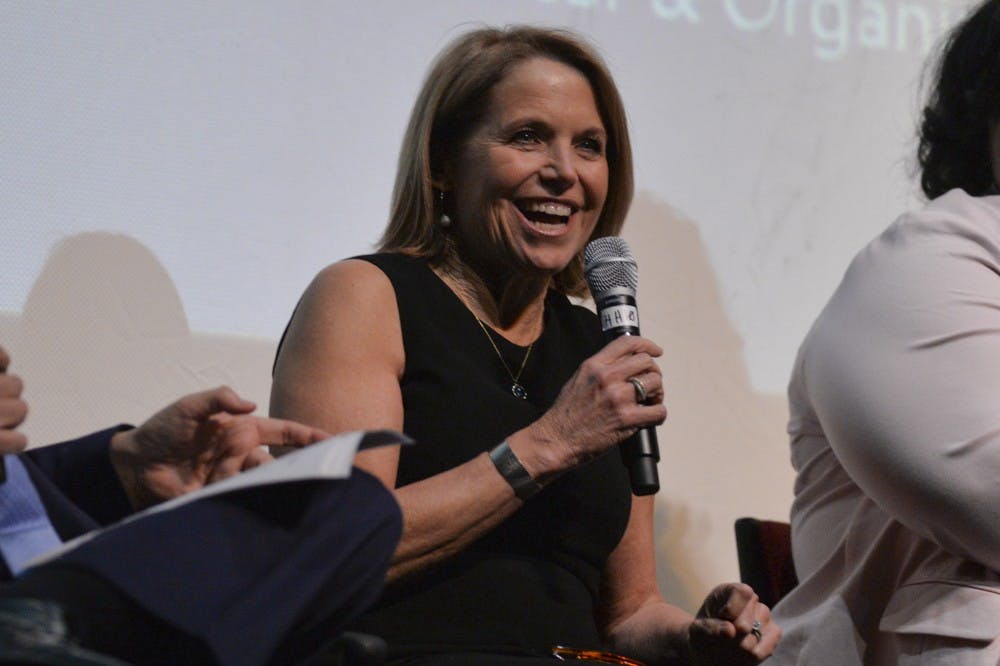The Virginia Film Festival hosted journalist and broadcaster Katie Couric for screenings Wednesday of her upcoming documentary series, “America Inside Out with Katie Couric,” which were accompanied by panel discussions.
Couric presented the first episode, “Re-Righting History,” to students, faculty and staff at Culbreth Theatre, and to Charlottesville community members at the Paramount Theater later that evening.
Couric is a University alumna who served as Senior Resident of the Lawn in 1978-79 and majored in English with a focus on American Studies.
At the first screening, Couric presented a preview of the series and the first episode.
Couric said she spent the last eight months traveling across the country to interview Americans of a wide range of viewpoints and identities about controversial social and political issues.
“I learned so much from talking to [the people I interviewed], but so much more from listening to them,” Couric said.
“Re-Righting History” sheds light on the national debate over Confederate monuments and buildings named after Confederate generals. The episode opened with the condition of Charlottesville and the University before, during and after the events of Aug. 11 and 12 in which white nationalists marched through Grounds with torches and held the deadly Unite the Right rally, respectively.
The publicly stated goals of these demonstrations was to protest a decision by the Charlottesville City Council in February 2017 to remove a statue of Confederate General Robert E. Lee in Lee Park, now Emancipation Park. The removal of the statue is currently undergoing litigation in the Charlottesville Circuit Court after a lawsuit was filed against the City and the City Council by the Monument Fund, Inc., the Virginia Division of the Sons of Confederate Veterans, Inc. and 11 other individuals.
Couric was present at both the Aug. 11 and 12 rallies. Violence broke out between protesters and counter-protesters Aug. 12 near Emancipation Park and along Market Street. One counter-protester, 32-year old Heather Heyer, died after a car plowed into a crowd of counter-protesters on Fourth Street. At least 30 others were injured in the attack.
For the Charlottesville segment of the documentary, Couric interviewed people both for and against the removal of the statue — from Unite the Right organizer Jason Kessler, to Gary Gallagher, a Civil War historian and University history professor, to Don Gathers, a local activist and former Chair of the now-defunct Blue Ribbon Commission on Race, Monuments and Memorials in Charlottesville.
Couric expanded the conversation to the national level, traveling to New Orleans, La., Montgomery, Ala. and Falls Church, Va. to have conversations about Confederate monuments, schools named after Confederate generals and memorials to recognize slaves and lynching victims.
“[Reporting on the Confederate monuments] made me realize what these symbols mean with certain people, and how Confederate alt-right iconography has been interpreted differently by different Americans,” Couric said in an interview with The Cavalier Daily. “It certainly made me realize this is much more than just about statues. It’s about history, it’s about ideology, it’s about how we view our past and how we’ve yet to acknowledge some of the uglier chapters.”
Following the screening of the episode at U.Va., Larry Sabato, Center for Politics director and politics professor, led a panel discussion with Gathers, Zyahna Bryant, a Charlottesville High School student who wrote the petition to have the Lee statue removed; Seth Wispelwey, United Church of Christ minister and a leader of Congregate Cville; and John Mason, an associate history professor and former vice chair of the Blue Ribbon Commission.
“I think that part of bringing this monument to the forefront as just a pinpoint image that we can use to say, like, 'We're trying to tear down inequality here,'” Bryant said. “It's hard to have several things in the abstract, so we can start with the monument, because it doesn't need to be there."
Gathers said during the panel many issues depicted in Couric’s documentary are deep-rooted across the nation.
“Slaves landed on the shores of this country in 1607, and we've been fighting the same battles ever since ...The mere fact that we have to do a documentary like this is very telling of this country," he said.
Couric told The Cavalier Daily she hopes by watching the show, viewers will become more informed about divisive issues to have constructive conversations.
“The whole point of these episodes is to keep talking about these issues,” Couric said. “I’m hoping it will give more background and some more information so when [viewers] think about their opinions or their feelings about Confederate statues and the names of buildings, that they’ll just have more information available from which they can draw their opinions and … continue to have conversations about this and other contentious, thorny issues that … deserve an airing of different opinions and perspectives.”
“America Inside Out” is set to premiere April 11 at 10 p.m. on National Geographic.





